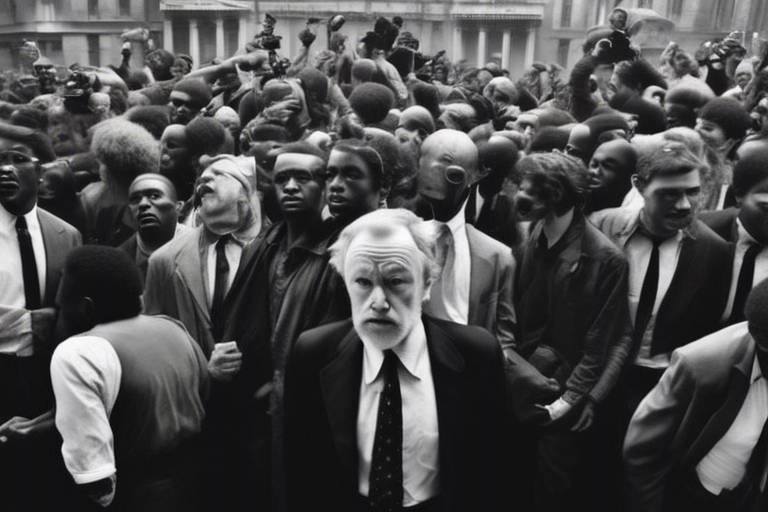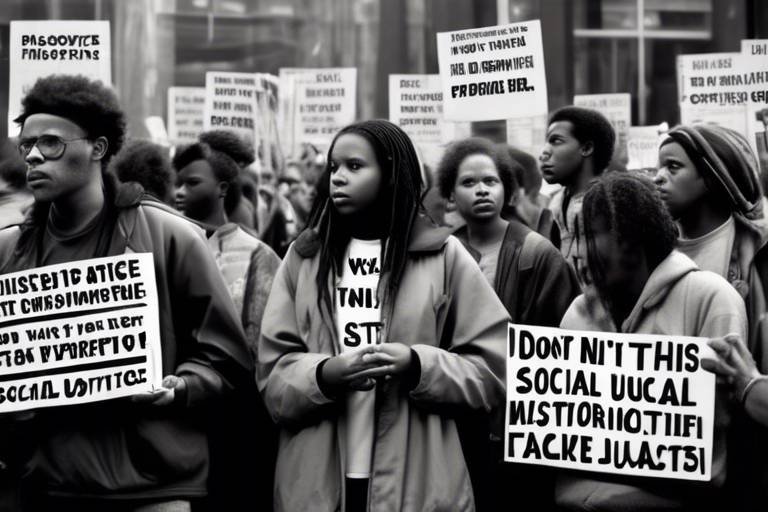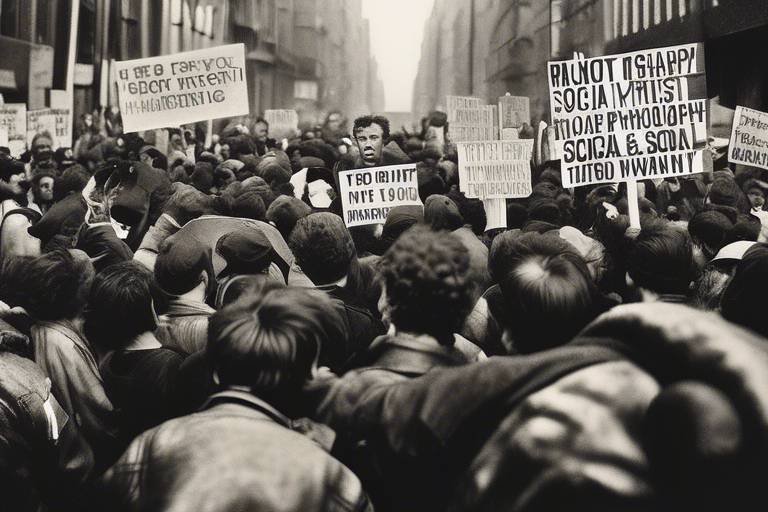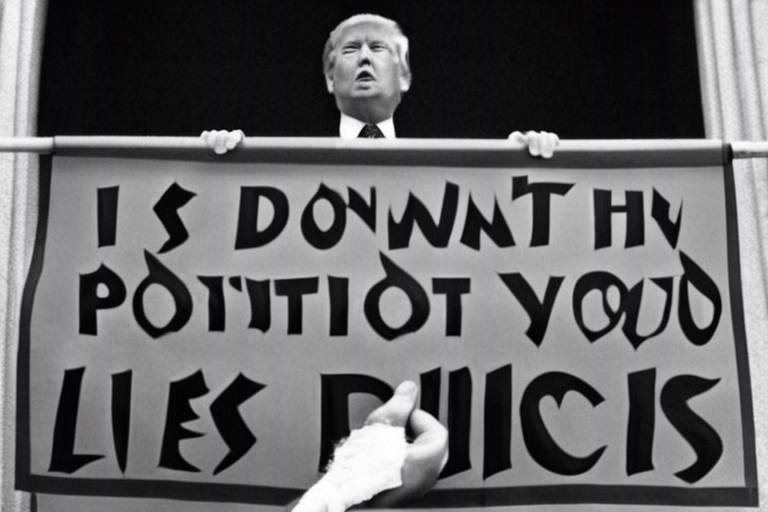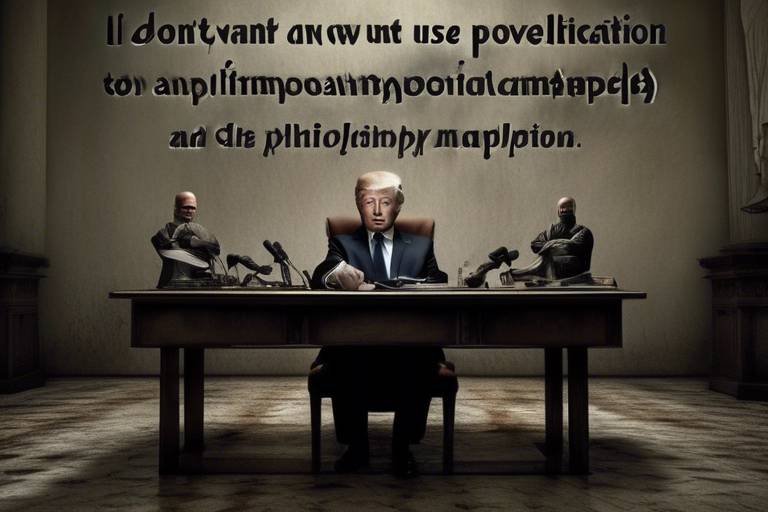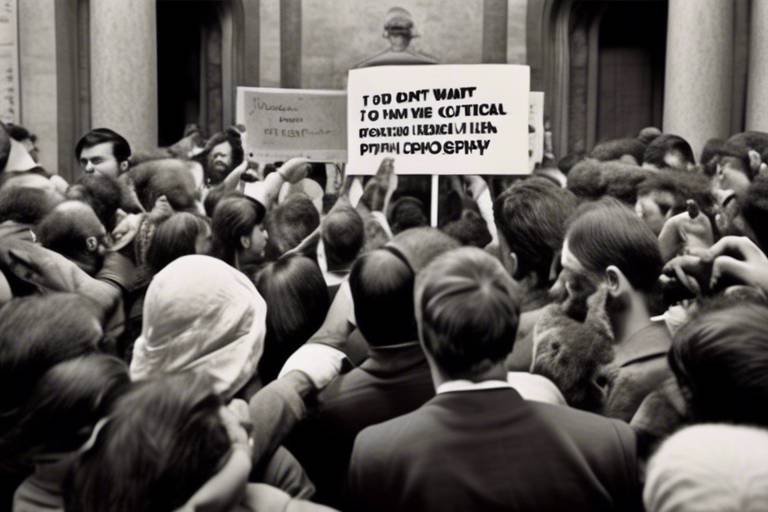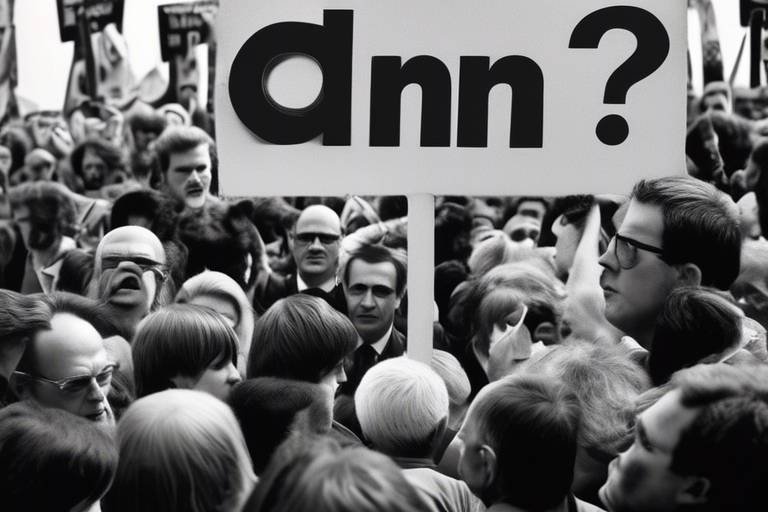Does Political Philosophy Hold the Answer to Social Inequality?
In a world where the gap between the rich and the poor seems to widen every day, many of us find ourselves asking: Can political philosophy provide a roadmap to social equality? This question isn't just academic; it's deeply personal for countless individuals and communities grappling with the harsh realities of inequality. Political philosophy, the study of fundamental questions about the state, justice, rights, and the role of individuals in society, offers various frameworks that can help us understand and potentially address these disparities. By delving into these philosophical perspectives, we can uncover insights that challenge our assumptions and inspire action towards a more equitable society.
At the heart of this exploration is the concept of justice. What does it mean to be just in a society riddled with inequality? Is it merely about equal distribution of resources, or does it extend to ensuring that everyone has the same opportunities to succeed? Political philosophers have long debated these issues, proposing different theories of justice that not only highlight the problems but also suggest pathways toward solutions. From the egalitarian ideals of John Rawls to the revolutionary thoughts of Karl Marx, the discourse surrounding justice is rich and varied.
Moreover, understanding these philosophical frameworks is crucial, especially in today's context where social movements are gaining momentum. As we witness protests for racial justice, economic equity, and environmental sustainability, the principles laid out by political philosophers become more relevant than ever. They help us navigate the complexities of modern society and offer a lens through which we can view the intricate web of inequalities that exist.
In this article, we will embark on a journey through the landscape of political philosophy, examining how various thinkers have tackled the issue of social inequality. We'll explore the role of justice, key philosophers and their perspectives, and the modern applications of these theories in our contemporary world. By the end, we hope to answer the pressing question: Can political philosophy hold the answer to social inequality?
Justice is not just a theoretical concept; it is a guiding principle for how we structure our societies. Different philosophical frameworks offer unique insights into what justice means and how it can be achieved. For instance, some argue that justice is about ensuring everyone has equal access to resources, while others contend that it is about recognizing and rectifying historical injustices. The implications of these theories are profound, influencing policies that shape our economic and social landscapes.
Throughout history, several philosophers have made significant contributions to our understanding of social inequality. Figures like John Rawls and Karl Marx have provided frameworks that not only critique existing systems but also propose alternative models for a more equitable society. Their ideas continue to resonate today, fueling debates about how best to address the disparities that plague our communities.
One of Rawls’ most compelling concepts is the veil of ignorance, a thought experiment that asks us to imagine a society where we do not know our own social status. In this scenario, we would design a system that prioritizes fairness and equality because we could end up in any position. This approach challenges us to think beyond our immediate circumstances and consider the broader implications of our choices. The veil of ignorance can inform policies aimed at reducing inequality by emphasizing the need for fairness in resource distribution.
Rawls proposed two principles of justice: the first mandates that each person has an equal right to the most extensive basic liberties compatible with similar liberties for others. The second principle allows for social and economic inequalities only if they benefit the least advantaged members of society. These principles aim to ensure a fair distribution of resources and opportunities, addressing systemic inequalities that have persisted for generations.
Despite the influence of Rawls’ theory, critics argue that it may overlook certain social dynamics, such as the impact of race, gender, and historical context on inequality. These critiques highlight the need for a more nuanced understanding of justice that takes into account the complexities of social structures. By examining these critiques, we can refine our approach to addressing social inequality and ensure that our solutions are comprehensive and effective.
On the other end of the spectrum, Karl Marx provides a critical lens through which to view social inequality, focusing on the concept of class struggle. Marx’s analysis of capitalism reveals how economic systems perpetuate disparities by prioritizing profit over people. His theories challenge us to consider the structural factors that contribute to inequality, urging us to rethink our economic systems in favor of more equitable alternatives.
As we navigate the complexities of the 21st century, contemporary political philosophy continues to evolve, addressing current social issues with fresh perspectives. The insights offered by historical figures remain relevant, but new theories are emerging that respond to the unique challenges we face today.
Libertarian perspectives often prioritize individual freedom over economic equity, arguing that government intervention can stifle personal liberties. However, this philosophy raises critical questions about the implications of unchecked capitalism on social inequality. How do we balance the need for freedom with the necessity of addressing disparities? This ongoing debate highlights the tension between personal liberties and collective responsibility.
Feminist political philosophy challenges traditional frameworks by emphasizing gender-based inequalities that have long been overlooked. By incorporating feminist perspectives, we gain a deeper understanding of how social disparities intersect with issues of gender, race, and class. This holistic approach is essential for developing effective strategies to combat inequality in all its forms.
- What is political philosophy? Political philosophy is the study of fundamental questions about the state, justice, rights, and the role of individuals in society.
- How does political philosophy address social inequality? It provides various frameworks that help us understand the roots of inequality and propose solutions to address it.
- Who are some key political philosophers? Notable figures include John Rawls, Karl Marx, and contemporary feminist theorists.
- What is the veil of ignorance? A thought experiment by John Rawls that asks us to design a society without knowing our social status, promoting fairness.

The Role of Justice in Political Philosophy
Justice is not just a word; it’s a powerful concept that shapes the very fabric of our societies. In the realm of political philosophy, justice serves as a guiding principle that influences how we perceive and address social inequality. Think of justice as the compass that directs us towards fairness and equity, ensuring that every individual has a voice and a chance to thrive. Different philosophical frameworks interpret justice in various ways, leading to diverse implications for social equity. For instance, some theories emphasize distributive justice, which focuses on the fair allocation of resources, while others highlight procedural justice, which prioritizes fair processes in decision-making.
At its core, the discussion of justice in political philosophy revolves around the question: What does it mean to be just? This inquiry is not merely academic; it has real-world implications for policies and practices that affect millions. For example, if we subscribe to a theory of justice that emphasizes equality, we might advocate for policies that aim to level the playing field, such as progressive taxation or universal healthcare. On the other hand, if we lean towards a meritocratic view of justice, we might argue that rewards should be based on individual effort and achievement, potentially exacerbating existing inequalities.
Moreover, the role of justice extends beyond individual rights to encompass collective responsibilities. It challenges us to consider how our actions impact others and what obligations we have to ensure a just society. This leads to a deeper understanding of social contracts and the responsibilities of both individuals and institutions. In this context, justice becomes a shared goal, a societal commitment to uplift those who are marginalized and to rectify systemic injustices.
To better illustrate the various interpretations of justice, consider the following table that outlines key theories and their implications:
| Theory | Key Focus | Implications for Social Equity |
|---|---|---|
| Distributive Justice | Fair allocation of resources | Promotes policies for wealth redistribution |
| Procedural Justice | Fair processes in decision-making | Ensures transparency and accountability |
| Restorative Justice | Repairing harm done to relationships | Focuses on reconciliation and healing |
| Social Justice | Equality and rights for all | Advocates for systemic change to address inequalities |
As we delve deeper into the realm of political philosophy, it becomes evident that justice is not a one-size-fits-all concept. The nuances of each theory offer valuable insights into the complexities of social inequality. By engaging with these philosophical frameworks, we can foster a more profound understanding of the challenges we face and the pathways toward a more just society.
In conclusion, the role of justice in political philosophy is pivotal. It not only shapes our understanding of fairness but also guides our actions towards achieving social equity. By critically examining the various theories of justice, we can better address the root causes of social inequality and work collectively towards a more inclusive and equitable world.
- What is the main focus of political philosophy?
Political philosophy primarily examines fundamental questions about justice, rights, and the role of government in society. - How does justice relate to social inequality?
Justice provides a framework for understanding and addressing the disparities that exist in society, guiding policies and practices aimed at promoting equity. - Why are different theories of justice important?
Different theories offer varied perspectives on fairness and equity, helping us to better understand the complexities of social issues and inform effective solutions.

Key Philosophers and Their Perspectives
When we dive into the realm of political philosophy, we encounter a rich tapestry of ideas woven by some of the most profound thinkers in history. These philosophers have grappled with the concept of social inequality, each offering unique insights that continue to resonate today. Their perspectives not only illuminate the roots of inequality but also propose frameworks for addressing these disparities in society. Among the most influential figures are John Rawls and Karl Marx, whose theories provide contrasting yet complementary lenses through which we can examine social justice.
John Rawls, an American philosopher, is best known for his seminal work, A Theory of Justice. He introduces the idea of the veil of ignorance, a thought experiment that encourages individuals to design a society without knowing their own social status, wealth, or abilities. This approach emphasizes fairness and impartiality, suggesting that principles of justice should be determined without bias. By imagining ourselves in this scenario, Rawls argues that we would create a society that prioritizes the well-being of its least advantaged members. This idea has sparked significant debate among scholars and policymakers alike, raising questions about how to implement such principles in real-world scenarios.
On the other hand, we have Karl Marx, whose critique of capitalism provides a stark contrast to Rawls’ theories. Marx posits that social inequality stems from the inherent class struggles that arise within capitalist societies. He argues that the ruling class, or bourgeoisie, exploits the working class, or proletariat, leading to systemic disparities in wealth and power. Marx’s analysis delves into the economic structures that perpetuate inequality, suggesting that true equality can only be achieved through the abolition of class distinctions. His revolutionary ideas have inspired countless movements and continue to influence discussions on economic justice today.
To better understand the differences between these two philosophers, we can summarize their key ideas in the following table:
| Philosopher | Core Idea | Approach to Inequality |
|---|---|---|
| John Rawls | Veil of Ignorance | Focus on fairness and justice for the least advantaged |
| Karl Marx | Class Struggle | Critique of capitalism and advocacy for class abolition |
These contrasting perspectives highlight the complexity of social inequality. While Rawls emphasizes a fair distribution of resources through a just framework, Marx calls for a fundamental restructuring of society to eliminate class-based disparities. The ongoing dialogue between these theories invites us to reflect on our own beliefs about justice and equality. Are we more inclined to support a system that seeks to redistribute resources fairly, or do we believe that dismantling the structures of power is the only way to achieve true equity?
As we navigate through contemporary issues of inequality, the thoughts of these philosophers serve as crucial touchstones. They not only challenge us to think critically about the systems in place but also inspire action towards building a more equitable society. In the following sections, we will explore how modern applications of their theories can inform our understanding of social disparities today.
- What is the veil of ignorance? The veil of ignorance is a thought experiment proposed by John Rawls that asks individuals to design a society without knowledge of their own social status, promoting fairness.
- How does Karl Marx view capitalism? Marx critiques capitalism as a system that leads to class struggle and social inequality, advocating for the abolition of class distinctions to achieve true equality.
- Can Rawls' principles be applied today? Yes, Rawls' principles of justice can guide contemporary discussions on wealth distribution and social policies aimed at reducing inequality.

John Rawls and the Veil of Ignorance
John Rawls, a towering figure in political philosophy, introduced the concept of the veil of ignorance in his seminal work, "A Theory of Justice." Imagine for a moment that you are tasked with designing a society from scratch, but here's the twist: you have no idea who you will be in that society. You could be rich or poor, healthy or sick, male or female, and you won’t know your race or social status. This hypothetical scenario is what Rawls calls the veil of ignorance, and it serves as a powerful tool for determining principles of justice.
By stripping away personal biases and circumstances, the veil of ignorance encourages individuals to think about fairness and equality in a more profound way. If you had no idea where you would end up in this new society, you would likely advocate for a system that protects the most vulnerable. This thought experiment pushes us to prioritize the common good over self-interest, fostering a sense of empathy and responsibility towards others.
Rawls argues that under the veil of ignorance, rational individuals would choose two fundamental principles of justice:
- The First Principle: Each person should have an equal right to the most extensive basic liberties compatible with similar liberties for others.
- The Second Principle: Social and economic inequalities should be arranged to benefit the least advantaged members of society (the difference principle).
These principles aim to create a fair distribution of resources and opportunities, ultimately addressing systemic inequalities that plague our societies. The first principle emphasizes individual freedoms, ensuring that everyone has access to fundamental rights, while the second principle calls for a safety net that uplifts those who are less fortunate.
However, while Rawls’ framework offers a compelling approach to justice, it is not without its critics. Some argue that his theory may oversimplify the complexities of social dynamics. For instance, can we truly separate individual circumstances from the broader social context? Critics suggest that Rawls' model might overlook the influence of historical injustices and cultural factors that shape inequality. This critique raises essential questions about whether a fair society can be achieved merely through abstract principles.
Despite these critiques, Rawls' veil of ignorance remains a vital concept in contemporary discussions about social justice. It challenges us to reflect on our own positions within society and consider how our choices impact others. By envisioning a world where we are all equally vulnerable, we can better understand the importance of policies that promote equity and inclusivity.
- What is the veil of ignorance? The veil of ignorance is a thought experiment proposed by John Rawls to help determine principles of justice by removing personal biases and circumstances.
- How does Rawls’ theory address social inequality? Rawls’ principles advocate for equal basic liberties and prioritize the well-being of the least advantaged, aiming for a fair distribution of resources.
- What are the main critiques of Rawls’ theory? Critics argue that Rawls’ framework may oversimplify complex social dynamics and overlook historical injustices that contribute to inequality.

veil of ignorance
This article explores the intersection of political philosophy and social inequality, examining how various philosophical frameworks address the roots and solutions to disparities in society.
Justice is a core concept in political philosophy, influencing how societies address inequality. This section discusses different theories of justice and their implications for social equity.
This section highlights influential political philosophers, such as John Rawls and Karl Marx, and their views on social inequality, providing a historical context for contemporary debates.
Rawls’ concept of the proposes a method for determining justice that prioritizes fairness. Imagine you’re at a party, but you don’t know who you are or what your social status will be once the music starts. Wouldn't you want to set up the rules in a way that ensures everyone has a good time, regardless of whether they're the host or the guest? This is essentially what Rawls suggests with his veil of ignorance. It encourages us to make decisions about the structure of society without the bias of our personal circumstances, leading to a fairer distribution of resources and opportunities.
Under this framework, individuals are stripped of their knowledge about their own social standing, wealth, abilities, or any other personal attributes. This thought experiment compels us to consider what kind of society we would create if we had no idea where we would end up within it. The idea is that, in such a position, we would advocate for policies that are just and equitable, as we would want to protect ourselves against the worst-case scenarios.
Exploring Rawls' two principles of justice, we find that they aim to ensure fair distribution of resources and opportunities. The first principle guarantees equal basic rights and liberties for all individuals. The second principle, often referred to as the difference principle, allows for social and economic inequalities only if they benefit the least advantaged members of society. This approach addresses systemic inequalities by promoting a society where the well-being of the most vulnerable is prioritized. In this way, the veil of ignorance serves as a powerful tool for envisioning a more just society.
Critics argue that Rawls' framework may overlook certain social dynamics. For instance, some suggest that the veil of ignorance fails to account for the historical context of existing inequalities, which can perpetuate systemic disadvantages. Others argue that the focus on distributive justice might neglect other important aspects, such as cultural recognition and individual autonomy. Evaluating these critiques is crucial for understanding social inequality, as it highlights the complexities involved in creating a truly fair society.
Marx’s analysis of class struggle provides a critical lens through which to view social inequality. This section delves into his theories on capitalism and its impact on societal disparities.
Contemporary political philosophy continues to evolve, addressing current social issues. This section examines how modern theories apply to ongoing discussions about inequality in today's society.
Libertarian perspectives often prioritize individual freedom over economic equity. This subsection analyzes the implications of this philosophy on social inequality and public policy.
Feminist theories challenge traditional political philosophy by highlighting gender-based inequalities. This section explores how these perspectives contribute to understanding and addressing social disparities.
- What is the veil of ignorance? The veil of ignorance is a thought experiment proposed by John Rawls that asks individuals to consider societal rules without knowing their own social status, ensuring fairness in justice.
- How does the veil of ignorance relate to social inequality? It encourages the creation of policies that protect the most vulnerable, promoting a fair distribution of resources and opportunities.
- What are the main critiques of Rawls' theory? Critics argue it may overlook historical inequalities and focus too much on distributive justice, missing other important aspects like cultural recognition.

proposes a method for determining justice that prioritizes fairness. This subsection examines how this idea can inform approaches to reducing inequality.
Justice is a core concept in political philosophy, influencing how societies address inequality. This section discusses different theories of justice and their implications for social equity.
This section highlights influential political philosophers, such as John Rawls and Karl Marx, and their views on social inequality, providing a historical context for contemporary debates.
Rawls’ concept of the veil of ignorance proposes a method for determining justice that prioritizes fairness. Imagine a scenario where you have to design a society without knowing your own position in it—whether you’ll be rich or poor, healthy or sick, educated or uneducated. This thought experiment encourages us to consider the needs of the least advantaged, ensuring that the principles we endorse will benefit everyone, regardless of their circumstances. By placing ourselves behind this veil, we can make choices that are more equitable and just.
This idea can significantly inform approaches to reducing inequality. For instance, policies derived from this philosophy would advocate for resources to be allocated in a way that uplifts the marginalized, rather than favoring those who are already privileged. The implications are profound: a society built on Rawlsian principles would focus on creating a safety net for the vulnerable, ensuring that everyone has access to basic needs such as healthcare, education, and a living wage.
Exploring Rawls' two principles of justice reveals how they aim to ensure fair distribution of resources and opportunities, addressing systemic inequalities. The first principle guarantees equal basic rights for all citizens, while the second principle allows for social and economic inequalities only if they benefit the least advantaged members of society. This framework challenges us to rethink our societal structures and encourages policies that promote equity and justice.
Critics argue that Rawls' framework may overlook certain social dynamics, such as the impact of historical injustices and systemic discrimination. Some believe that his model is too idealistic and does not adequately address the complexities of real-world inequalities. This subsection evaluates these critiques and their implications for understanding social inequality, emphasizing the need for a more nuanced approach that considers intersectionality and the lived experiences of marginalized groups.
Marx’s analysis of class struggle provides a critical lens through which to view social inequality. This section delves into his theories on capitalism and its impact on societal disparities.
Contemporary political philosophy continues to evolve, addressing current social issues. This section examines how modern theories apply to ongoing discussions about inequality in today's society.
Libertarian perspectives often prioritize individual freedom over economic equity. This subsection analyzes the implications of this philosophy on social inequality and public policy.
Feminist theories challenge traditional political philosophy by highlighting gender-based inequalities. This section explores how these perspectives contribute to understanding and addressing social disparities.
- What is the veil of ignorance? The veil of ignorance is a thought experiment proposed by John Rawls that asks individuals to design a society without knowing their own social position.
- How does Rawls’ theory address social inequality? Rawls’ theory emphasizes fairness and justice, advocating for policies that benefit the least advantaged members of society.
- What are the critiques of Rawls' theory? Critics argue that Rawls' framework may be too idealistic and overlook historical injustices and systemic discrimination.
- How does Marx view social inequality? Marx believes that social inequality arises from class struggle, particularly in capitalist societies where the bourgeoisie exploit the proletariat.

Principles of Justice as Fairness
John Rawls’ theory of justice, particularly his , serves as a beacon for understanding how we can strive for equity in society. At its core, this framework is designed to ensure that every individual has an equal opportunity to succeed, regardless of their starting point in life. Imagine a race where everyone begins at the same starting line; this is the essence of fairness that Rawls advocates. His two principles are not just theoretical musings; they offer a practical guide to addressing social inequalities.
The first principle emphasizes that each person should have an equal right to the most extensive basic liberties compatible with similar liberties for others. This means that fundamental rights—like freedom of speech, religion, and the right to vote—are non-negotiable. Rawls argues that these liberties are essential for individuals to pursue their own conception of the good life. It brings us to ponder: can we truly consider ourselves a just society if these liberties are not universally available?
The second principle, known as the Difference Principle, states that social and economic inequalities should be arranged so that they are to the greatest benefit of the least advantaged members of society. This principle is particularly revolutionary, as it shifts the focus from mere equality to a more nuanced understanding of equity. Rawls encourages us to think about how policies can be structured to uplift those at the bottom of the social ladder. For instance, consider a society where access to quality education and healthcare is prioritized for the underprivileged. This could lead to a ripple effect, improving overall societal well-being.
To illustrate these principles more clearly, let’s consider a simple table comparing traditional equality versus Rawls' approach:
| Aspect | Traditional Equality | Rawls' Justice as Fairness |
|---|---|---|
| Starting Point | Everyone is treated the same regardless of circumstances. | Recognizes different starting points and aims to level the playing field. |
| Focus | Equality of outcomes for all. | Equity in opportunities, especially for the least advantaged. |
| Implementation | Uniform policies applied to everyone. | Policies designed to benefit the most disadvantaged first. |
Critically, Rawls’ principles invite us to ask challenging questions about our societal structures. Are we doing enough to ensure that our policies reflect these ideals? Are we truly considering the implications of our decisions on the least advantaged? These reflections are crucial as they encourage us to engage in meaningful dialogue about the nature of justice and fairness in our society.
In conclusion, Rawls’ provide a robust framework for addressing social inequalities. They challenge us to rethink our understanding of justice, urging us to create a society where everyone has not only the right to participate but also the genuine opportunity to thrive. As we navigate the complexities of social disparities, it is this commitment to fairness that can guide us towards a more just and equitable world.
- What are the two principles of justice proposed by John Rawls?
Rawls proposed the principle of equal basic liberties and the difference principle, which aims to benefit the least advantaged. - How does the difference principle address social inequality?
The difference principle suggests that inequalities are acceptable only if they benefit the least advantaged members of society. - Why is the veil of ignorance important in Rawls' theory?
The veil of ignorance helps individuals make unbiased decisions about justice, as they do not know their own social position.

Critiques of Rawls’ Theory
While John Rawls’ theory of justice has been influential in shaping contemporary discussions on social inequality, it is not without its critics. One of the primary critiques revolves around the assumption that individuals can truly detach themselves from their social positions when considering justice. Critics argue that the veil of ignorance—a key component of Rawls' framework—may oversimplify the complexities of real-world inequalities. They contend that people cannot fully disregard their backgrounds, experiences, and identities, which inevitably influence their perspectives on fairness.
Moreover, some philosophers argue that Rawls’ principles, particularly the difference principle, which permits inequalities only if they benefit the least advantaged, might inadvertently justify existing disparities. For instance, if a society is structured in such a way that the wealthy benefit from the exploitation of the poor, this principle could be manipulated to legitimize such a system, leading to a moral paradox. Additionally, critics like Robert Nozick have posited that Rawls’ theory undermines individual rights and freedoms, suggesting that the redistribution of wealth infringes upon personal property rights.
Another significant critique is that Rawls’ framework does not adequately address issues of intersectionality. Social inequalities are not merely economic; they are also shaped by race, gender, sexuality, and other factors. Critics argue that Rawls’ model, which primarily focuses on economic justice, fails to account for the multifaceted nature of oppression. This oversight can lead to a one-dimensional approach to addressing inequality, neglecting the experiences of those who exist at the intersections of various marginalized identities.
In response to these critiques, some scholars have sought to expand upon Rawls’ ideas, incorporating elements of feminist theory and critical race theory to create a more comprehensive understanding of justice. These adaptations aim to address the shortcomings of Rawls’ original framework by emphasizing the importance of recognizing and addressing the diverse experiences of individuals within society.
Ultimately, while Rawls’ theory provides a foundational perspective on justice and inequality, it is essential to engage with these critiques to develop a more nuanced approach to social equity. The ongoing debates surrounding his ideas illustrate the dynamic nature of political philosophy and its relevance in addressing contemporary issues of inequality.
- What is the veil of ignorance? The veil of ignorance is a method proposed by John Rawls to determine the principles of justice by asking individuals to consider what rules they would choose if they were unaware of their own social positions.
- How does Rawls’ theory address social inequality? Rawls’ theory, particularly through the difference principle, aims to ensure that any social or economic inequalities benefit the least advantaged members of society.
- What are the main critiques of Rawls’ theory? Critics argue that Rawls’ framework oversimplifies the complexities of social identities, may justify existing inequalities, and undermines individual rights.
- How have scholars responded to critiques of Rawls? Many scholars have sought to expand Rawls’ ideas by incorporating perspectives from feminist theory and critical race theory to create a more comprehensive understanding of justice.

Karl Marx and Class Struggle
Karl Marx, a towering figure in political philosophy, provides a profound lens through which we can examine social inequality. His analysis of class struggle is not just a historical recount; it's a vibrant theory that continues to resonate in today's socio-economic landscape. At the heart of Marx's thought is the idea that society is fundamentally divided into different classes, primarily the bourgeoisie (the owners of the means of production) and the proletariat (the working class). This division creates inherent conflicts and disparities, as the interests of these classes are often at odds.
Marx argued that the capitalist system inherently exploits the proletariat. The bourgeoisie profits from the labor of the workers, who receive only a fraction of the value they create. This exploitation leads to a cycle of inequality, where the rich get richer while the poor remain trapped in a cycle of poverty. To illustrate this point, consider the following table that summarizes Marx's view of class relations:
| Class | Role | Economic Interest |
|---|---|---|
| Bourgeoisie | Owners of production | Maximize profit |
| Proletariat | Workers | Fair wages and working conditions |
This table highlights the stark contrast between the two classes and their conflicting interests. Marx believed that this class struggle is the engine of historical change, driving societies toward revolution and ultimately a classless society. He envisioned a future where the proletariat would rise against the bourgeoisie, overthrowing the capitalist system and establishing a society based on communal ownership and equality.
Furthermore, Marx's critique extends beyond economics; he delves into the cultural and ideological superstructures that perpetuate inequality. He posits that the ruling class not only controls the economy but also the prevailing ideas and values of society. This means that the dominant ideology often serves to justify the status quo, making it difficult for the working class to recognize their exploitation. In this way, Marx's philosophy challenges us to question the narratives we accept and to seek a deeper understanding of the forces that shape our lives.
In contemporary discussions, Marx's insights remain relevant as we examine issues like income inequality, labor rights, and the impacts of globalization. The rise of gig economies and the precarity of work echo Marx's concerns about exploitation in new forms. As we navigate these challenges, Marx's emphasis on solidarity among the working class serves as a powerful reminder of the potential for collective action to address social disparities.
In summary, Karl Marx's analysis of class struggle provides a critical framework for understanding social inequality. His exploration of economic exploitation and the power dynamics between classes invites us to reflect on our own societal structures and consider how we might work towards a more equitable future.
- What is the main idea of Marx's class struggle?
Marx's class struggle theory posits that society is divided into classes with conflicting interests, primarily the bourgeoisie and the proletariat, leading to exploitation and inequality. - How does Marx's theory apply to modern society?
Marx's insights into economic exploitation and class conflict are still relevant today, particularly in discussions around income inequality and workers' rights. - What solutions does Marx propose for social inequality?
Marx advocates for a revolutionary change where the proletariat would overthrow the capitalist system, leading to a classless society based on communal ownership.

Modern Applications of Political Philosophy
As we navigate the complexities of the 21st century, the relevance of political philosophy has become increasingly apparent. It serves as a lens through which we can examine and critique modern societal issues. Today, political philosophy isn't just an abstract discipline; it informs real-world policies and debates that directly affect our lives. From economic disparities to social justice movements, the applications of political philosophy are vast and varied.
One of the most pressing issues of our time is social inequality, which has been exacerbated by globalization and technological advancements. Political philosophers today are grappling with how to address these disparities effectively. For instance, the rise of populism and the resurgence of debates around welfare policies challenge traditional notions of governance and equity. As we look at these modern applications, we can categorize them into several key areas:
- Economic Justice: How should wealth be distributed in a society that values both freedom and equality?
- Social Justice Movements: How do movements like Black Lives Matter and #MeToo utilize philosophical frameworks to advocate for change?
- Environmental Ethics: What responsibilities do we have to future generations regarding climate change and resource distribution?
In the realm of economic justice, many modern philosophers draw from the foundations laid by thinkers like John Rawls and Karl Marx. They argue that economic policies should not only promote growth but also ensure that the benefits of that growth are shared equitably among all members of society. This perspective challenges the neoliberal focus on individualism and market efficiency, advocating instead for a more collective approach to economic well-being.
Meanwhile, social justice movements have harnessed the power of political philosophy to articulate their demands. For example, the principles of intersectionality, introduced by Kimberlé Crenshaw, emphasize the interconnected nature of social categorizations such as race, class, and gender. This framework helps activists and theorists understand that social inequalities do not exist in silos but are often compounded, requiring multifaceted solutions.
Furthermore, the rising concern for environmental issues has led to the development of environmental political philosophy. Thinkers in this field argue that our ethical obligations extend beyond human society to include the natural world. This perspective challenges us to rethink our economic systems and their impact on the environment, advocating for sustainable practices that consider the long-term health of our planet.
In conclusion, the modern applications of political philosophy are not just theoretical musings; they are crucial in shaping the policies and practices that govern our lives. As we move forward, it's essential to engage with these philosophical frameworks to foster a society that is not only just but also equitable and sustainable.
- What is the role of political philosophy in addressing social inequality? Political philosophy provides frameworks and theories that help us understand and address the roots of social inequality, guiding policy decisions and social movements.
- How do modern social movements utilize political philosophy? Modern social movements often draw on philosophical concepts to articulate their goals, create awareness, and advocate for systemic change.
- What is environmental political philosophy? Environmental political philosophy examines our ethical obligations to the environment and future generations, advocating for sustainable practices in governance and economics.

Libertarianism and Economic Inequality
Libertarianism is a political philosophy that champions individual freedom and minimal government intervention in both personal and economic affairs. At its core, libertarianism posits that individuals should have the right to make choices about their own lives, as long as those choices do not infringe upon the rights of others. This philosophy raises intriguing questions about the relationship between economic inequality and personal liberty. Can a society that values freedom truly address the disparities in wealth and opportunity that exist among its citizens?
Libertarians argue that economic inequality is a natural byproduct of a free market system. They believe that when individuals are allowed to pursue their own interests without government interference, it leads to innovation, competition, and ultimately, wealth creation. This perspective suggests that attempts to redistribute wealth or impose equality through governmental means can stifle individual initiative and economic growth. In essence, libertarians view economic inequality not as a problem to be fixed, but as a sign of a vibrant and dynamic economy.
However, this viewpoint raises important questions about the social contract and the role of government in ensuring a fair playing field. Critics of libertarianism argue that without some level of intervention, systemic inequalities can perpetuate themselves, leading to a society where the rich get richer while the poor struggle to survive. They contend that a truly just society must address these imbalances, ensuring that everyone has access to the resources and opportunities necessary to thrive.
To illustrate this tension, consider the following table that outlines key arguments from both libertarian and critical perspectives on economic inequality:
| Perspective | Key Arguments |
|---|---|
| Libertarianism |
|
| Critical Perspective |
|
As we navigate the complexities of economic inequality, it becomes clear that libertarianism offers a compelling yet controversial framework. While it emphasizes the importance of personal freedom, it also risks overlooking the structural barriers that can prevent individuals from achieving their potential. Thus, the debate continues: can a society that prioritizes individual liberty effectively tackle the deep-rooted issues of social and economic inequality? Or must we find a balance between freedom and fairness to create a more equitable world?
- What is libertarianism? Libertarianism is a political philosophy that emphasizes individual freedom and minimal government intervention in personal and economic matters.
- How do libertarians view economic inequality? Libertarians often see economic inequality as a natural result of a free market and believe that government intervention can hinder economic growth.
- What are the criticisms of libertarianism regarding inequality? Critics argue that libertarianism overlooks systemic inequalities and that some government intervention is necessary to ensure equal opportunities for all.

Feminist Political Philosophy
Feminist political philosophy emerges as a vital critique of traditional political theories, which often overlook or marginalize women's experiences and perspectives. At its core, this philosophical movement seeks to unveil the intricate ways in which gender shapes our understanding of justice, power, and social structures. It challenges the notion that political philosophy can be neutral or objective, arguing instead that it is deeply embedded in the social and historical contexts that produce it. Just like a fish cannot see the water it swims in, many political theories fail to recognize the pervasive influence of gender norms and expectations.
One of the key contributions of feminist political philosophy is its focus on the concept of intersectionality. This term, coined by Kimberlé Crenshaw, emphasizes that individuals experience overlapping social identities—such as race, class, and gender—that can compound disadvantages or privileges. For instance, a woman of color may face unique challenges that differ significantly from those encountered by a white woman or a man of color. By acknowledging these complexities, feminist theorists provide a more nuanced understanding of social inequality and advocate for policies that address these intersecting disparities.
Feminist political philosophers also critique the traditional dichotomy between the public and private spheres. Historically, the public sphere has been associated with politics and power, while the private sphere has been relegated to the domestic realm, often viewed as less significant. Feminists argue that this separation perpetuates gender inequality by devaluing women's contributions within the home and failing to recognize how domestic labor supports the broader economy. This perspective invites us to reconsider the value of caregiving and household work, challenging us to think about how these roles are essential to societal functioning.
Moreover, feminist political philosophy has sparked significant discussions around reproductive rights and bodily autonomy. The fight for women's rights to make decisions about their own bodies—whether it concerns access to contraception, abortion, or healthcare—has become a central issue in contemporary political discourse. Feminists argue that control over one's body is fundamental to achieving equality and autonomy, and any political philosophy that ignores this aspect is inherently incomplete.
In practical terms, feminist political philosophy informs a range of social movements and policies aimed at achieving gender justice. For example, initiatives to close the wage gap, combat domestic violence, and promote equal representation in political offices are all rooted in feminist principles. These movements highlight the necessity of incorporating women's voices and experiences into political discussions, ensuring that policies reflect the needs of all members of society.
As we move forward in addressing social inequality, it's crucial to integrate feminist perspectives into our understanding of political philosophy. By doing so, we not only enrich our theoretical frameworks but also foster a more inclusive and equitable society. Feminism teaches us that true justice cannot be achieved without considering the diverse experiences of all individuals, particularly those who have been historically marginalized.
- What is feminist political philosophy? Feminist political philosophy critiques traditional political theories and emphasizes the importance of gender in understanding justice and social structures.
- How does intersectionality relate to feminist political philosophy? Intersectionality highlights how overlapping social identities, such as race and gender, affect individuals' experiences of inequality.
- Why is the public-private divide significant in feminist thought? Feminists argue that the separation devalues women's roles in the private sphere and perpetuates gender inequality by ignoring the importance of domestic labor.
- What are some key issues addressed by feminist political philosophy? Key issues include reproductive rights, the wage gap, domestic violence, and the need for equal representation in politics.
Frequently Asked Questions
- What is political philosophy?
Political philosophy is a branch of philosophy that explores fundamental questions about government, justice, rights, and the role of individuals in society. It seeks to understand how societies can be organized and governed in a way that promotes fairness and equity.
- How does political philosophy address social inequality?
Political philosophy examines various theories of justice and equity to address social inequality. By analyzing the principles of fairness, it provides frameworks for understanding and potentially remedying disparities in wealth, opportunity, and power among different social groups.
- Who are some key philosophers in political philosophy?
Some influential political philosophers include John Rawls, who is known for his "veil of ignorance" concept, and Karl Marx, who focused on class struggle and capitalism's role in creating inequality. Each philosopher offers unique insights into the causes and solutions for social disparities.
- What is John Rawls' theory of justice?
John Rawls' theory of justice, particularly his principles of justice as fairness, proposes that a just society is one where individuals would agree on its rules if they were unaware of their own social status. This idea aims to ensure that resources and opportunities are distributed fairly, addressing systemic inequalities.
- What are the critiques of Rawls’ theory?
Critics of Rawls argue that his framework may not adequately account for the complexities of social dynamics and the realities of power imbalances. Some suggest that it overlooks certain forms of inequality, such as those based on gender or race, which require more nuanced approaches.
- How does Karl Marx view social inequality?
Karl Marx analyzes social inequality through the lens of class struggle, arguing that capitalism inherently creates disparities between the bourgeoisie (owners) and the proletariat (workers). His critique emphasizes the need for systemic change to address these inequalities.
- What is the relevance of modern political philosophy to social issues?
Modern political philosophy continues to evolve, addressing contemporary social issues like economic inequality, gender disparities, and environmental justice. By applying various philosophical frameworks, it offers insights into how societies can tackle these pressing challenges effectively.
- How does libertarianism relate to economic inequality?
Libertarianism prioritizes individual freedom and minimal government intervention, which can lead to significant economic inequality. Proponents argue that this approach fosters innovation and personal responsibility, while critics contend that it neglects the need for equitable resource distribution.
- What role does feminist political philosophy play in addressing inequality?
Feminist political philosophy challenges traditional political theories by highlighting gender-based inequalities and advocating for the inclusion of women's perspectives in political discourse. It emphasizes the importance of addressing systemic barriers that perpetuate gender disparities in society.

